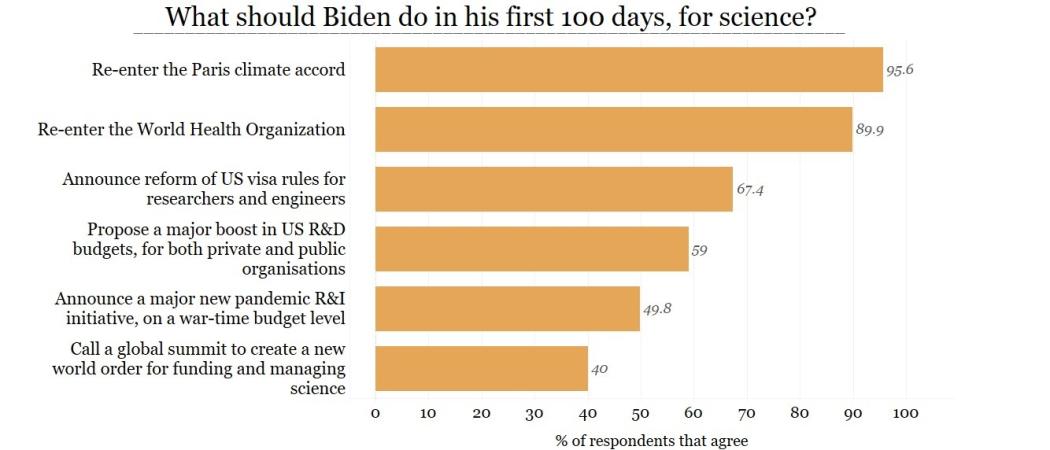A Science|Business survey finds the world research community is dying for the US to collaborate more on pandemic, climate and other science challenges

For the research community watching Joe Biden’s inauguration from around the globe, there is one overwhelming demand: For the sake of science and the world, the US needs to play better with others.
In an online survey by Science|Business, international cooperation in science was the No. 1 recommendation that the research world has for the new administration. At least 90% of respondents said he should rejoin the Paris Climate Accord and the World Health Organisation – which he promptly began doing within hours of his inauguration. But beyond that, the vast majority of survey respondents endorsed new ways for US scientists and agencies to work with the rest of the world.
On pandemic research, 83% called for greater international cooperation in general, and 55% specifically urged creation of a new international system to monitor and model infectious diseases.
“Science is a world-wide activity,” wrote one anonymous respondent to the survey. “Collaborate rather than isolate the USA.”
On science generally, the top of a list of possible recommendations was to increase the number of bilateral R&D funding programmes with other countries; 64% ranked that suggestion in their top three wishes for the new administration. Further, 56% urged that the US join the European Union’s Horizon Europe R&D programme – an invitation from Brussels that the Trump Administration pretty much rejected in 2019.
And 67% urged Biden to reform US visa rules so researchers and engineers can more easily enter the country – another agenda item on which Biden immediately announced plans for action.
And then there’s China…
The only hesitation among respondents was over how to handle China: 50% said Biden should force China to protect US intellectual property with trade penalties if necessary, and another 39% said that “maybe” he should take that hard-line approach (11% were opposed). Likewise, opinion was split when asked if Biden should end Trump-era constraints on scientific collaboration with China: 21% said yes, 49% said “maybe” and 21% voted no.
The survey was conducted online from December 16 to January 19 – a turbulent month in which the world watched aghast as the chaotic US pandemic response killed thousands more Americans, and a Trump-incited mob stormed the US Capitol. In all, 231 people from the world research community completed the questionnaire – 70% from Europe, and 10% from the US. There wasn’t a vast difference in responses between US and non-US respondents, though the Americans tended to be more leery about China and urged higher US research funding. By profession, respondents were pretty evenly split among the academic, industry and policy worlds.
So far, every indication is that the incoming administration is listening to the science community. A few days before the inauguration, Biden vowed to put scientific evidence at the top of his policy agenda and named his chief scientific adviser to a cabinet-level position.
A to-do list for Biden
The survey asked respondents to vote on a specific list of ideas for international collaboration – and most of them attracted a plurality of respondents. About 62% said he should expand international student exchange programmes and boost R&D collaborations with developing countries. About 40% urged that he call a global summit to create a new world order for funding and managing science.
But many also volunteered ideas rather than merely tick survey boxes. On China, one respondent suggested focusing scientific collaboration “on non-conflict issues, like clean water.” In the same vein, another proposed “goodwill” cooperation in climate, COVID or space exploration. One, however, urged that Biden “support freedom of speech of Chinese scientists.”
On climate, 79% suggested establishing a new federal agency specifically dedicated to climate research; 78% urged that Biden plan and fund green infrastructure development. One respondent suggested a “private sector and public sector Manhattan Project” to tackle climate change, while another urged he “go full ahead” with nuclear fusion and make the US “the first country to power itself on fusion energy.” Currently, the world’s most advanced fusion energy development project is in southern France.
Another suggested that the US and EU create “bilateral incentive mechanisms for startups to get a foothold in the US (and for US companies in Europe.)”
There were also – not surprisingly given the dramatic news over the holidays – many who suggested that Americans need some serious help understanding science.
As one respondent said, “Get science back into schools at all levels, in order to make the US science literate again. And start the process of getting the US to join the metric system!”





 A unique international forum for public research organisations and companies to connect their external engagement with strategic interests around their R&D system.
A unique international forum for public research organisations and companies to connect their external engagement with strategic interests around their R&D system.